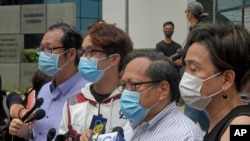With the majority of Hong Kong’s pro-democracy opposition in jail facing myriad charges against individuals and associated groups, authorities’ attention has turned to the city’s civil society organizations, experts say.
When Hong Kong's national security law went into effect last year, it acted as a catalyst for authorities to arrests dozens of high-profile activists following the anti-government protests in 2019. The law prohibits things such as secession and foreign collusion, and those convicted of breaking it can be punished with up to life imprisonment.
But the fear of the law alone is now affecting the city’s top civil society groups. The Hong Kong Alliance in Support of Democratic Movements of China is facing its most difficult period to date after announcing it will reduce its number of staff to minimize any security threats.
Richard Tsoi, the group’s secretary, is one of the seven who are resigning from their posts. He told VOA the decision was made to reduce the risk for future prosecution, with the alliance operating at a minimum. It will work with volunteers to do some of the work of the full-time staff members who are leaving. The risk to the volunteers would not be great, Tsoi said.
“We will definitely continue the operation of the Hong Kong Alliance, we will not surrender. But we think we should at least try to reduce the number of our leadership, our committee members. Basically now, seven out of the 14 committee members will resign. We are hoping to reduce the potential harm to us. With lesser manpower and resources but definitely will continue to see how we deal with the situation in the future,” Tsoi said.
The organization was founded two weeks before June 4, 1989, when China’s People’s Liberation Army violently cracked down on pro-democracy protesters in Beijing’s Tiananmen Square, killing unknown numbers. The alliance today is known for assembling Hong Kong’s annual Tiananmen Square candlelight vigil commemoration. But authorities have banned the memorial for the last two years, citing the coronavirus pandemic.
The current chairman, veteran activist Lee Cheuk Yan, is in jail. But speaking to VOA in 2020, Lee said it would be “very difficult” for the annual vigil to be legally approved again.
“It’s not [just] the Tiananmen Square vigils, it’s everything that have attraction for the masses,” he said at the time.
Like Lee, the Hong Kong Alliance's vice-chairman, Albert Ho, also is serving a jail sentence. Both pleaded guilty to participating in an illegal assembly during Hong Kong’s 2019 protests. Tsoi was one of two people who received suspended sentences by a Hong Kong court in May. The remaining eight were given immediate jail terms, including Lee and Ho, as well as media mogul Jimmy Lai.
Lai, 73, was the founder of the pro-democracy newspaper Apple Daily that was forced to close in June after 26 years of publication after national security authorities arrested company executives for suspected foreign collusion and froze the company’s financial access.
Chow Hang-tung, the vice-chairwoman for the Hong Kong Alliance, said she is well aware their organization, like the media, is being targeted.
“Apart from media I think they want to target civil society organizations, NGOs and all these political parties and groups. … A lot of people are saying the Civil Human Rights Front or us [Hong Kong Alliance] are the authorities’ next target,” she told VOA.
Chow spoke to VOA hours before police arrested her on June 30, following allegations she was inciting assembly ahead of the July 1 anniversary of Hong Kong’s handover from Britain back to China. She remains in custody.
Political analyst Joseph Cheng, formerly of Hong Kong but now in Australia, told VOA in a phone call that civil society groups now face more pressure than in previous years because of the national security law.
“The members, the leaders feel very threatened. There is a concern that staff members working for such groups are in danger,” Cheng said.
He added their reduction of staff numbers reflects Hong Kong’s declining freedoms under the security law.
“In a way, this is very much related to the national security law. The joint alliance (Hong Kong Alliance and the Civil Human Rights Front) insists on using one of the slogans, maintaining one of the principles to terminate one-party dictatorship, and this has been interpreted against the national security law. As a result, there is a distinct danger the members will be prosecuted,” Cheng said.
And he added that civil society groups are going to find it very difficult to operate today in Hong Kong.
“You have to be politically correct to engage in associations. And this demand for political correctness has become very strict,” Cheng added.
It comes after more than half of the 400 elected district councillors across 18 Hong Kong districts quit their posts following a recently implemented oath-taking law that targets “unpatriotic” civil servants. Pledging alliance deemed mandatory to lawmakers and government officials until the new law came into effect in May of this year.
During the height of the anti-government protests in November 2019, the District Council elections saw a landslide victory for the pro-democracy opposition. Although local councillors are usually assigned to improving community welfare, the election results were deemed to be an unofficial referendum supporting the city’s large democratic movement. Nearly 3 million people voted, which is slightly less than half of the 7.5 million population in Hong Kong.
Under the “one country, two systems” agreement signed by Britain and China in 1997, after the city was transferred back to Chinese rule, Beijing promised that Hong Kong would retain a “high degree of autonomy” until 2047.
After 2019’s anti-government protests, Beijing implemented the national security law for Hong Kong that came into effect on June 30, 2020. Among other things, it prohibits secession, subversion, terrorism and collusion with foreign forces, and its details can be widely interpreted.






